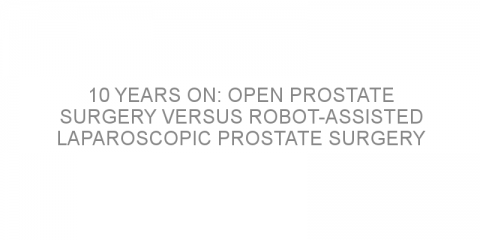In a nutshell This study compared long-term outcomes of open prostate surgery and robot-assisted laparoscopic prostate surgery. Researchers reported similar treatment outcomes at 10 years between the two surgical approaches. Some background Prostate surgery (also called radical prostatectomy) is a common treatment for localized (confined)...
Read MoreProstate cancer Posts on Medivizor
Two new predictors of cancer recurrence after surgery: Perineural invasion and lymphovascular invasion
In a nutshell This study examined two new predictors of prostate cancer recurrence – perineural invasion (PNI) and lymphovascular invasion (LVI). Researchers reported increased recurrence risk after prostate surgery if patients show PNI or LVI before surgery, particularly if both were present. Some background Localized (confined)...
Read MoreIncreasing Awareness: What is Cachexia?
Eating Together For many, being able to commune around a table–talking, laughing and eating–is a sign of health and well-being. That’s why, when someone is sick, and doesn’t eat, conflict can result. Caregivers may feel enormous anxiety, guilt and hopelessness as their loved one loses weight. Yet, caregivers need to know what is...
Read MoreLooking for men with progressive, metastatic castration-resistant prostate cancer who are able to undertake vigorous physical activity
In a nutshell This phase 2 trial aims to compare the benefit of two types of exercise for men with metastatic castration-resistant prostate cancer. The main outcome to be investigated is the safety of the exercises and its effect on cancer pain. The trial is recruiting in San Francisco (California). The details Metastatic castration-resistant...
Read MoreRadium-223 is safe and effective when combined with other therapies
In a nutshell This study examined the safety and effectiveness of radium-223, alone or in combination with other therapies, in treating metastatic castration-resistant prostate cancer (mCRPC). Researchers concluded that radium-223 was well tolerated and can be safely combined with additional therapies. Combined therapies were associated with improved...
Read MoreComparing surgery and radiation therapies for high-risk prostate cancer
In a nutshell This study compared prostate surgery and radiation therapy in treating high-risk prostate cancer. Authors reported similar survival benefits with both treatments. However, high doses of total radiation combined with hormone therapy was associated with the lowest risk of disease progression. Some background Prostate surgery and...
Read MoreHigh dairy intake after prostate cancer diagnosis may be associated with increased mortality risk
In a nutshell This study examined the association between dairy intake after prostate cancer diagnosis and mortality risk. Researchers reported increased mortality risk among men with high dairy intake after prostate cancer diagnosis. Some background Advances in treatment and early detection of prostate cancer have increased survival and...
Read MoreAre older prostate cancer patients (aged 75 years or more) candidates for surgery?
In a nutshell This study examined prostate surgery as a treatment option for older prostate cancer patients compared to younger patients. The authors concluded that prostate cancer patients aged 75 years or more can be suitable candidates for surgery. Some background Radical treatment options for prostate cancer, such as surgery, are often not...
Read MoreWhat treatments are available for patients progressing after primary and secondary hormone therapy?
In a nutshell This study examined treatment patterns for metastatic castration-resistant prostate cancer (mCRPC) progressing after treatment with abiraterone acetate (Zytiga). Chemotherapy with docetaxel (Taxotere) was the most common subsequent therapy. Authors concluded that patients with mCRPC who progress after AA may still benefit from subsequent...
Read MoreExamining the risk of disease recurrence more than 10 years after prostate surgery
In a nutshell This study examined risk factors for prostate cancer recurrence more than 10 years after prostate surgery. Researchers concluded that disease recurrence rates continued to increase between 10 and 20 years after surgery. Age at surgery and increased cancer markers were found to be predictive of late disease recurrence. Some background...
Read MoreAn Overview of Hormonal Therapy Options for Advanced Prostate Cancer
How does prostate cancer work? With Andrew Schorr as host, Dr. Russell Szmulewitz of the University of Chicago Medical Center gives a short description of the endocrinology of prostate cancer and provides an overview of hormonal therapies. Listen as Dr. Szmulewitz examines the changing treatment paradigm including risks and...
Read MoreHow to Best Communicate Prostate Cancer Treatment Side Effects to Your Healthcare Team
How do I manage my side effects for better quality of life? Patient Power founder and host, Andrew Schorr, facilitates a dialogue between advanced prostate cancer experts, Dr. William Catalona, Dr. Russell Szmulewitz of University of Chicago Medical Center, and Judith Paice, PhD, RN to discuss managing and communicating treatment side effects. ...
Read More












